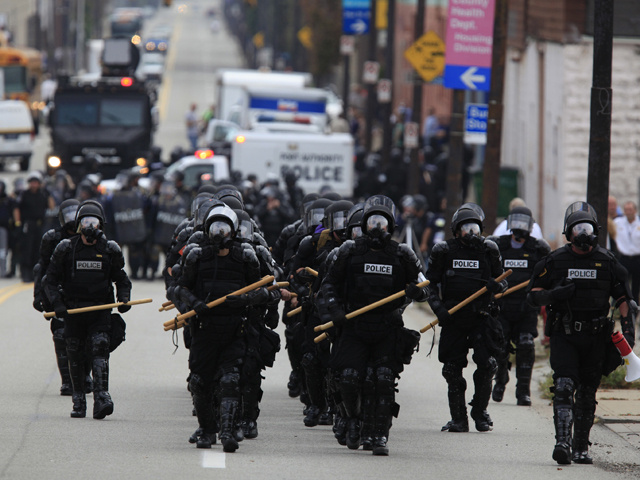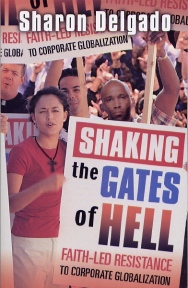 I believe that Hearts & Minds customers are the I believe that Hearts & Minds customers are the
sorts of folks who are aware of the news.. I am sure I don’t have
to explain the significance of the recent G20 Summit, and I suspect many of us
are praying that the diplomats there will follow through with intentions to be
fair and just.
You also know that there were protests. It needs to be
said that some of the protesters (a large number of them) are anarchists; some
have legitimate concerns about the complicity of the modern state in Empire
building and colonialism and injustice. Some are just rowdy ideologues wanting
to smash stuff–nasty left wing versions of skinheads out to cause some
trouble. And, it seems evident, Pittsburgh sure did have a lot of riot-police there to suppress dissent, which, it seems, they did quite thoroughly.
 However, it is also important to note that many who marched were However, it is also important to note that many who marched were
attempting to make an important statement, a witness to the ways in which these
important global leaders have failed to take the poorest members of the human
family into consideration; from its earliest days, and the infamous meeting in Seattle, this Summit has symbolized
how just a few powerful countries (or, should we say, a few powerful leaders
within those countries) have dominated and set the terms for international
economic issues. So, many NGOs and human rights groups use it to campaign for a more just global order, and
they are right to do so.
The Jubilee USA campaign to Drop the Debt, for
instance, has been embraced by denominations and church leaders from across the
globe and this is a perfect venue to ask questions about the Western developed
nations promises to set right the injustices and human suffering that were
caused by their previous manipulation of aid and trade, debt and high interest.
An evangelical friend of mine, with many contacts in the African community in
Pittsburgh, helped lead workshops and teach-ins on this huge issue this week.
He worked with African diplomats, scholars and students and, while they threw no bricks
and did no rioting, their good work is seen and dismissed too easily by lumping
them all together with the anarchist disruptions. (Click on the Jubilee USA campaign link above to find a chapter near you if you want to be more involved.)
The ONE campaign, also
had a presence in Pittsburgh with a simple plea: schedule the next global
economic global economic summit in Africa, where the needs are so great, and the voices under-represented. Again, they have a great website with some good information. If you haven’t visited them lately, please do.
This is the moral heart of the protests, that
those who are in greatest need–sometimes and in some ways because of the bad
policies of previous Western leadership–are given a voice of redress, are
treated as participants in their own futures, and that the trade and aid biases
be reconsidered in ways that are guided by justice for all and not the self-interest
of the powerful. Yes, there is much to the critique, even if it obscured by the kids with handkerchiefs over their faces and their silly sloganeering.
I heard a radio advertisement on a Christian radio
station in Pittsburgh that week that cheerfully advised listeners to avoid downtown during the Summit (which was garrisoned off by National Guard, anyway) by attending a helpful event that they were sponsoring
in the suburbs. “Get far away from the crazies and the politicians,” they
advised.
It is a shame that evangelicals (and many other faith traditions) so easily
dismiss both groups, without realizing that they had brothers and sisters in that they had brothers and sisters in
Christ in both camps, politicians and protesters, whose calling they (unintentionally) demeaned. Surely there are some well-intended Christians seeking to
be salt and light Daniels or Josephs or Esthers, voices of wisdom and justice, within the high-powered diplomatic
community; likewise, as I have noted, some of the protesters were themselves
devout Christians, seeking to raise a Godly voice for the common good.
Perhaps
instead of running to the suburbs the radio station should have boldly invited
folks into the mix of politicians and protesters. Yes, yes, I know, it is easy
for me to say this from the relative quiet of Dallastown. And I understand that
there was some danger, not knowing what the unauthorized, wilder faction of protesters were going
to spring. Still, there were congregations and faith communities in Pittsburgh
that were trying to support both Summit leaders, protesters, the press and the
curious with a ministry of presence and involvement. (There was also a considerable prayer ministry, behind the scenes, that some churches had developed.) I hope you had some
friends that were there; one good friend went to “pray with his feet” as Rabbi Abraham Heschel used to say, but left when the tear gas canisters came; another H&M fan was quoted in one of the national news stories. I hope you were paying attention to some of these reports. Resistance to
injustice is a holy calling and while hitting the streets, doing civil
disobedience and mass protest may not be the most effective way to work for
appropriate reforms, there obviously is a time and place for such public
witness.
There are opportunities to be involved in issues of
creation-care, global justice, economic stewardship, witnessing for peace and public righteousness and the conversations next week about the Summit will be interesting, I’ll bet. In my September monthly review column (to be posted soon) are a few books that will help guide us as we engage in thoughtful
conversations about what went on in Pittsburgh this week, in the convention center and in the streets, and what will continue
to go on in the months to come.
We have specialized in these kinds of books about Christian views of public justice and international affairs
since we opened, and are sad to hear that not many religious bookstores stock
stuff on global poverty, Christian views of economics, stuff for citizen
action. Maybe that is changing, as most religious publishers have done some
books along these lines. Let us pray they continue to do so, that bookstores
stock them and that people buy them. It is easy to fault local bookstores or
church libraries for not having this kind of stuff, but it is often because they
are not purchased by the consumers. (Uh, dear reader, that you be you.) When they don’t sell, the publishers are understandably reluctant to issue too many more, and then, of course, folks complain that the church isn’t adequately resourced. We’ll, we stock ’em whether they sell or not, and trust that the right readers will find us.
So if
you care to know that we have these kinds of things, pony up and buy some; read ’em or give ’em away to people who might be interested.
Start a study group, get a social concerns committee going at your church or
campus fellowship, start a Sunday school class. Let us know what your doing,
and perhaps we can serve you further by offering resource lists, book titles or
action projects. There are so many really good books available. Will trust you value our telling you about them. Will you help us get the word out? We believe that is why
you choose to read our blog and order from our shop. For that, we thank
you.
Here is the link to the book list of a few good titles on
globalization, international justice over at the monthly column pages. These may be helpful to inspired faith-based folk to raise up a
witness for the common good, offering unique insights and passions,
Biblically-influenced and spiritually sound. Feel free to forward it to anybody
who might care. Thanks again.
In the meantime, though, I will do a brief shout out to a few that you just have to know about. Firstly:
 If you want to do some theological reflection written by the kind If you want to do some theological reflection written by the kind
of person who would be protesting—and arrested–at the Summit, I have to tell
you about Shaking the Gates of
Hell: Faith-Led Resistance to Corporate Globalization by Sharon Delgado
(Fortress; $20.00.) The first page of the book describes her night in jail
after the infamous Seattle G-8 Summit. Here, she speaks hard truths
about the injustices of the global economy, the imbalances of power, the
rape of the Earth and the way nonviolent active resistance can be spiritually
enriching, joyful, showing a better way as a symbol of Christian hope. Jurgen Moltmann says of it, “This
book is authentic and convincing with personal experience and a great vision. In many
corners of the world there is a new paradigm emerging…I read this book with a
moved heart and new encouragement.” Catherine Keller, a theologian from Drew,
simply says, “This book doesn’t just shake, it rocks!” If you wished you could
be part of a spiritually rooted, nonviolent uprising, this is for you. If you
really don’t have a clue why some people see the world like this, and intend to
make a better world a reality, read it and learn. Before you dismiss the
protesters as crazies or anarchists or fools, give her a chance.
G2020% blog dealShaking the Gates of Hellusually $20 now only $16order here
Hearts & Minds 234 East Main Street Dallastown, PA 17313 717.246.3333
|
|
|
 I believe that Hearts & Minds customers are the
I believe that Hearts & Minds customers are the



Thanks for this article. We have always been the sort of evangelicals who are concerned about poverty and injustice, finding ourselves a woeful minority on Sundays. Our daughter has a passion for these issues. She built and led a successful silent demonstration on the Carnegie Mellon campus, site of Michelle’s breakfast and across the street from the Friday G20 dinner. She is constantly presenting Christ as the One who cares about the poor, to skeptical Christians and those outside any faith who work in poverty areas (and, this particular week, to anarchists).